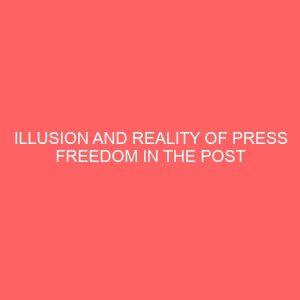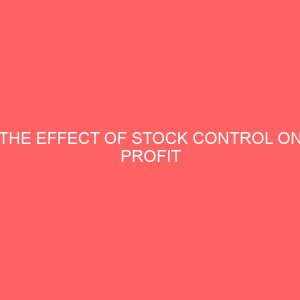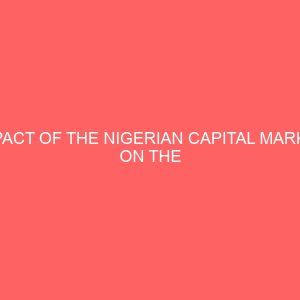Description
ABSTRACT
The main aim of this research is to determine the role of insurance companies on the Economy of Cameroon using the Cameroon insurance industry as case study. This purpose of the study is to know whether or not there exist a role played by insurance companies on Cameroon Economy. We had to split our main objective into two in order to analyze the role of both life and non-life insurance companies on the economy of Cameroon. This is done using secondary sources of data on the GDP of Cameroon and other indicators of insurance companies such as the total insurance coverage, adequacy of social insurance ,insurance and financial services. After the analysis, the main results showed that insurance companies play a role on the Economy of Cameroon as portrayed with the use of the Pearson correlation. At the end, we came up with some recommendations that the government should keep on motivating the insurance companies through their policies because of the determinant role they play in the economy and that insurance companies on their own part should try to increase the awareness of their products and services to the public.
CHAPTER ONE
INTRODUCTION
1.1: Background of the study
A lot of debate can be emphasized on the role played by insurance companies in the world but simplicity entitles us to concentrate on the economy of Cameroon. Whether insurance or assurance throughout the ages, there has always been a need for insurance. The need for insurance arises from fear of the unknown, fear of risk and fear of loss (Webster dictionary, 1997). People want to be insured against the unknown and factors for which they have little control. However, insurance as we know it did not spring up but has evolved over centuries based on changes in need, regulation, and technology( Buckham & etal , 2010).
The earliest known insurance instrument dates back to the Babylonian period of Circa 2250 BC (Buckham & etal, 2010).When the Babylonians developed a type of loan insurance for marine business. Upon receipt of loan to fund a shipment, a merchant would typically pay the lender an additional premium in exchange for the lenders guarantee to conceal the loan should the shipment be stolen or lost at sea. Here, the lender assumed the peril of the good in transit at a premium rate of interest. These marine loans persisted until the thirteenth century in the Italian city states of Genoa and Venice. (Buckham & Etal , 2010).
Ships and cargo were constantly in danger of being seized by pirates while both financial and non-financial risk diversification where developed in the form of joint stock ventures, pooling of goods of a number of merchant to be sold jointly. (Buckham & etal, 2010). The merchant did not formalize the concept of probabilities in the statistical sense; they relied on intuition, subjective experience and objective record to guide the estimation rather than on the former probabilistic reasoning based on actuarial evidence. Pascal triangle led to the first actuary tables that are still used in calculating insurance rates (Beattie, 2016).
Life and health insurance had it importance in 1840 when the industrial revolution created need for security that had traditionally given to a nation of farmers. Health insurance started as accident insurance in 1950 with the first auto insurance in 1898(Dictionary of America, 2003) .In terms of practice, insurance companies are divided into two namely life and non-life insurance companies. Life insurance include whole life (death), term and endowment, health while non-life insurance include liability loss, workers compensation and property loss (Messomo,2015).Today, Cameroon counts about 25 insurance companies (Minepat,2012). Insurance companies have been described as the business that exists in order to ensure the survival of other business (Muhammed, 1998). Insurance companies are of vital importance in an economy.
An economy is what people produce and the relationship that make that production possible (Ian welsh, 2013). Others define an economy as the process or system by which goods and service are produced, sold and bought in a country or region(Merriam Webster,1828).The economy of Cameroon like any other economy in the world suffered some economic crisis in 1986 as a result of changing international economic and domestic policy environment (Derrick, 1992) which once boomed in the mid 1970 with a 7% growth rate and a per capita income of $800(Wilfred &Mufor, 2011).Which saw the collapse of some banks in Cameroon such as the Cameroon bank, Meridian BIAO and BICIC.
(Molua, 2010) noted that Cameroon experienced a boom in its renewable and exhaustive natural resources exploitation from the mid 1970 to the end of the 1980. The economy of Cameroon has gone through three decades.
This comprises the period of real economic growth particularly in the year 1960 to 1986.The period of economic crisis that stem up in the period of 1986 to 1994 and the period of economic recovery that started from 1995 to date which is a period referred to as globalization. Cameroon responded to this crisis by reducing public expenditure (Baye et al, 2002).
1.2: Statement of the problem
Insurance companies in an economy serve as financial intermediaries. By their nature, they bear risk and these risks partly depend on the insurer’s ability to anticipate the frequency magnitude of the risk they promise to cover. They transfer resources from those who would save to those who will invest (Richard et al, 1990). In fact, without an insurance industry, the economy would practically come to a standstill (McGrath, 1990).From this assertion of (McGrath, 1990), then this main question: What is the role played by insurance companies in an economy?
From the above, we can generate the following specific questions as follows:
• What is the role of life insurance companies in Cameroon economy?
• What is the role of non-life insurance companies in Cameroon economy?
1.3: Research Objectives
The main objective of this study is to examine the role played by insurance companies in Cameroon economy. With specific objectives as;
• Identifying the role of life insurance companies in Cameroon economy.
• Analyzing the role of non-life insurance companies in Cameroon economy.
• Making Recommendations.
1.4 Working Hypotheses
We are going to use the following working hypotheses:
H1: Life insurance companies play a role in Cameroon economy.
H2: Non-life insurance companies play a role in Cameroon economy.
1.5 Significance of the Study
This study is of primordial importance to the various parties which include; the student, organizations and the government. With respect to the student, it is important because it will aid them to identify loopholes in an organization or an economy. Next, it will equally serve as a benchmark for future researchers who will envisage tackling this problematic. Lastly, it is a university requirement as partial fulfillment in order to enroll for a bachelor’s degree.
As far as an organization is concerned, it will help the organization to identify its key position in an economy or the role it plays in economic development. If well understood it entitles companies to revisit their policies or the services they offer so that it suits the need of the economy because it is worth noting its services directly affects the public or its customers and the economy as a globe. Again, it equally helps the organization to understand the changing environment.
Last but not the least, the study is equally important to the government as it will guide them on their policy implementation by identifying the key roles of insurance companies will generate useful information which will be used to predict the future. It will equally be helpful for them to compare the business with other businesses in the same sector.
1.6 Scope and Delimitation
This study attempts to demonstrate the role played by life and non-life insurance companies in an economy and covers a one year academic that is academic year 2015-2016. The case study in visage to explain this phenomenon is the Cameroon insurance industry. The major difficulty in this study is to get reliable information concerning the subject matter under investigation.
1.7 Plan of the Study
This study is segmented into five chapters as organized below;
Chapter one is the introductory chapter which is divided into seven and where we have the background information, the problem statement, the research objectives, and research hypotheses, significance of the study, scope and limitation and lastly the plan of the study. Chapter two is literature review which contains segments such as conceptual issues, related theories, empirical literature and theoretical framework while chapter three is the methodology.
In chapter four, we present the results of the data analyzed and interpret the results which is conversely to chapter five where we make a summary of the study, draw conclusions and provide our recommendations.







